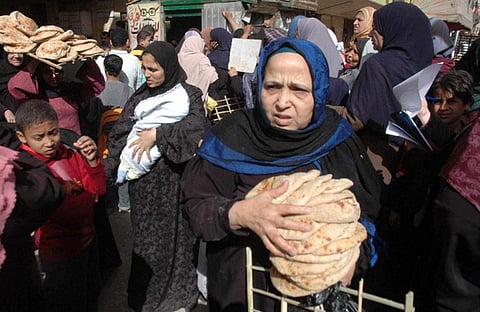Egypt cautiously revamps bloated subsidy system
Last month, a government bid to trim access to subsidised bread sparked street protests

Cairo: Egyptian authorities are revising long lists of beneficiaries from a bloated state subsidy in a move aimed at overhauling the decades-old system as the country grapples with a tough economic crisis.
The revision, which started this month, is aimed at excluding 10 per cent of the 71 million people currently having access to the ration card system that entitles holders to get subsidised food, Minister of Supply Ali Al Meselhi said in media remarks this week.
The government has given ration card holders a two-month deadline to “update” their data at registration offices in order to help in the revision process.
Al Meselhi ruled out “haphazard” exclusion for fear of a public backlash in a country where more than 40 per cent of its 92 million people are believed to be living below the poverty line.
“All problems that have faced ration card holders in the past, including haphazard exclusion and unjustifiable suspension of some cards will be over by July at most,” Al Meselhi said.
Last month, dozens of temporary card holders took to the streets in some Egyptian cities protesting a government decision denying them access to the heavily subsidised bread.
The protests erupted weeks after Al Meselhi was picked to head the Ministry of Supply, which is responsible for the distribution and availability of subsidised food commodities in Egypt.
Al Meselhi, who made the controversial decision, said it was aimed at stopping bakeries from misusing the system for illegal financial gains. He soon backed down.
Bread is a staple for many Egyptians.
The government has repeatedly urged those who do not deserve obtaining a monthly quota of the subsidised bread and other food items to voluntarily give up their ration cards in order to avoid unspecified fines.
There are no official figures about the feedback.
Egypt’s subsidised system dates back to the Second World War years. The government has said it has allocated a total of 86 billion Egyptian pounds (Dh17.5 billion) in subsidy of bread and other food items in the country’s public budget for the new fiscal year staring in July.
Egypt’s efforts to downsize state subsidies come as the country is experiencing its worst economic crisis in decades.
Last November, Egypt floated its local currency and cut state subsidy on fuel as part of harsh economic reforms.
The measures secured Egypt an IMF bailout loan of $12 billion over a period of three years.
In recent months, several lawmakers have called for overhauling the subsidy system, arguing that a significant portion unfairly benefits the wealthy class.
“Revising lists of ration card holders to remove those who do not deserve them is a step that should be taken as soon as possible,” MP Jamal Uqabi said.
“Failure to do this comes to the benefit of some people, who earn millions of pounds from keeping the situation unchanged,” he added in a recent press statement.
Uqabi argued that citizens’ income level should be a key criterion for defining beneficiaries from the system.
“Ration cards should be provided only for the limited income brackets and the poor. This will help a lot in reducing deficit in the public budget.”
The Egyptian economy has been in decline since the unrest that followed the 2011 uprising that scared away foreign tourists and investors.
Since taking office in mid-2014, President Abdul Fattah Al Sissi has been able to restore stability to the country in an effort to revive foreign investment and tourism.
In recent months, Egypt has suffered from shortage of basic commodities, which the government blamed on what it called “greedy” merchants.



